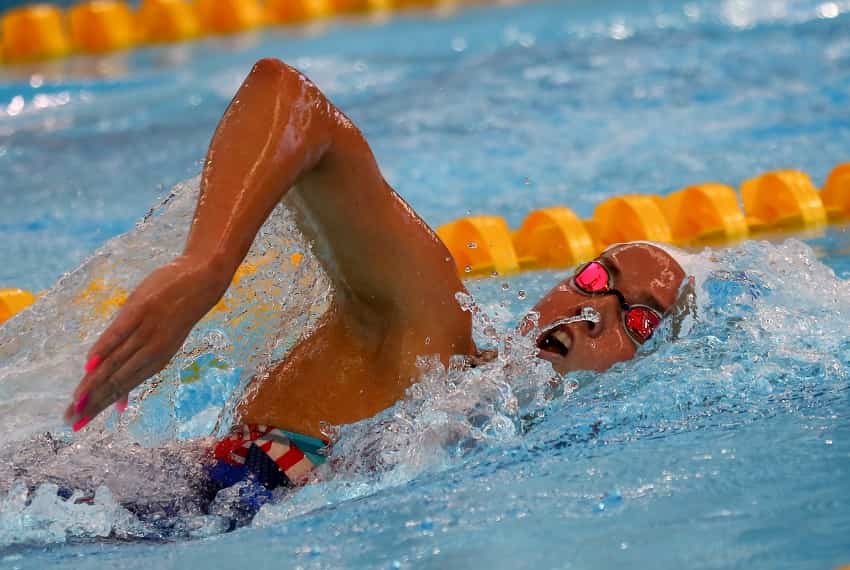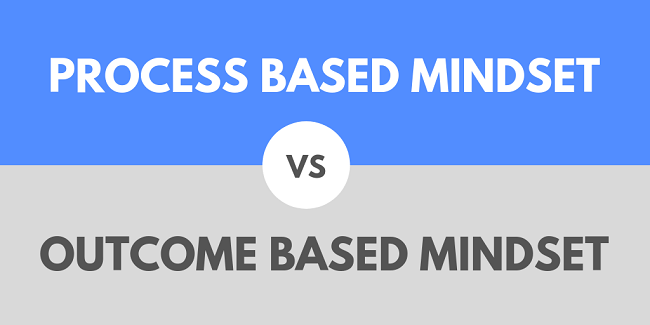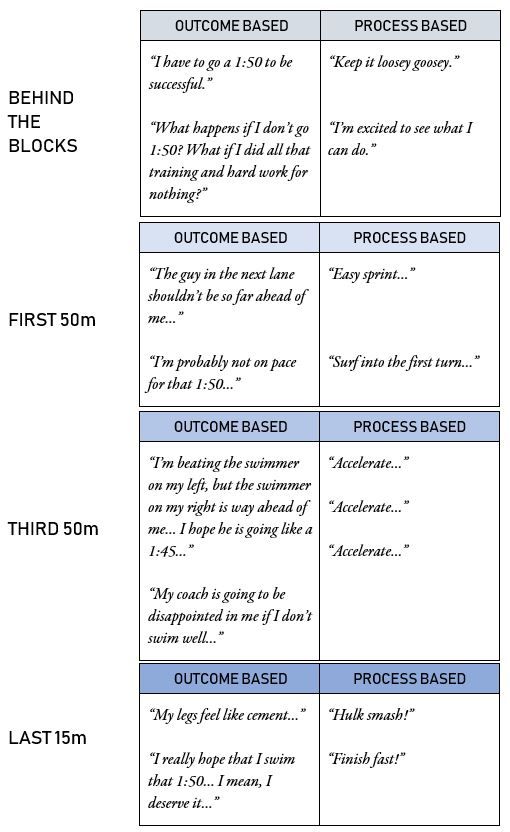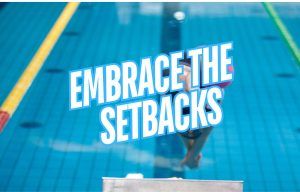Your coach has likely told you to trust and follow the process. Here’s an illustration of just how powerful this mindset can be when it comes to stepping up on the blocks.
I talk a lot about the process in the newsletter, on the blog, in my articles for SwimSwam/USA Swimming, and even over the dinner table.
Why?
Because I deeply believe that a process-based approach can help solve a lot of the struggles that swimmers face in the water.
Everything from overthinking, comparison-making, pre-race anxiety, and basically any other mindset hazard that we conjure up to sabotage our swimming.
But what does a process-based approach actually look like?
What does it smell like?
(Chlorine and success, if I had to guess.)
Instead of just talking about how cool being process-focused is, today I wanted to give you an example of what a process-based mindset looks like when compared to an outcome-based mindset.
For our example we have two swimmers.
They are the same height, weight, have the same amount of talent. They go to the same workouts. Give the same effort in training. They even share the same goofy cat memes on the ‘gram that get the same number of likes.
The only difference? One has a process-based mindset and the other has an outcome-based mindset. That’s it.
Our example swimmers both have a clear goal: they want to go 1:50 for the 200 freestyle at the big championship meet.
They’ve been training all season for this opportunity, and in the moments before the start, as they approach the blocks, we get a peek at what’s going on under their swim caps.
Okay, the race is over.
Both swimmers are holding onto the wall, panting, looking back at the scoreboard.
Based on the thoughts and mindsets you just read, who do you think was more likely to have swum a 1:50?
Who do you think experienced less anxiety?
Who do you think felt like they were in control of their performance from beginning to end?
A great process takes the result out of the picture
I suspect that one of the main reasons swimmers have a hard time going all in on being process-focused is that it seems counter-intuitive…
Pretty much, yeah.
In the example above, you’ll notice that our process-based swimmer didn’t even think about the time. The final time wasn’t the goal—executing a deadly race was the goal.
From staying loose and relaxed before the race using some simple self-talk (“Loosey goosey”) to reframing anxiety as excitement (“I’m excited to see what I can do here”).
Our process-based swimmer also used performance cues to keep them on point (“Easy speed!”, “Accelerate!”) and some motivational self-talk (“Hulk smash!”) to help nail each part of their race.
The sum of which, we can reasonably guess, was a fast swim. Or at the very least, a swim that came close to what the swimmer is capable of.
They created the outcome they wanted without focusing on the outcome at all. (How is that for some brain Jiu-Jitsu?)
Our outcome-focused swimmer, on the other hand, was mentally all over the place.
He rode a roller coaster of doubt during the race as swimmers around him sped ahead or lagged behind. He focused on what others might be thinking, taking him mentally out of what he was supposed to be focusing on to perform well.
The added anxiety and stress chipped away at performance, and although the swimmer probably felt like they gave a full effort, they likely realize that the time on the scoreboard was well short of their potential.
At the end of the day, the difference in performance wasn’t all about talent. Or who had trained harder at practice. It wasn’t even about who wanted it more.
It came down simply to mindset.
Start by using this mindset in practice
Spend a few minutes before your next practice writing out some simple phrases and performance cues that will keep you process-oriented.
The next time you get a monster set at swim practice, deploy them to help you swim well and fast.
The more often you use this kind of mindset, the less you will find yourself thinking about the things that cause performance to crash in the water.
Things like:
- The pain of the rest of the set still to come…
- How fast other swimmers are swimming…
- Where this practice lines up in relation to your season-end goals…
And so on.
Morale of the fairy tale is pretty simple: If it’s awesome outcomes and results you want, build yourself an awesome process.
More Stuff Like This:
This Mental Training Workbook Will Help You Swim Like a Rock Star This Season. Confused about mental training? Want to unleash pro mode on your swimming this year? Learn how this mental training workbook will change your mindset and help you pummel your PB’s this season.
Why Change is So Hard in the Pool (and How to Make It Easier). We all want change in some measure—so why is it so dang difficult to make happen? Here’s the reality behind making change that actually sticks in the pool.
















